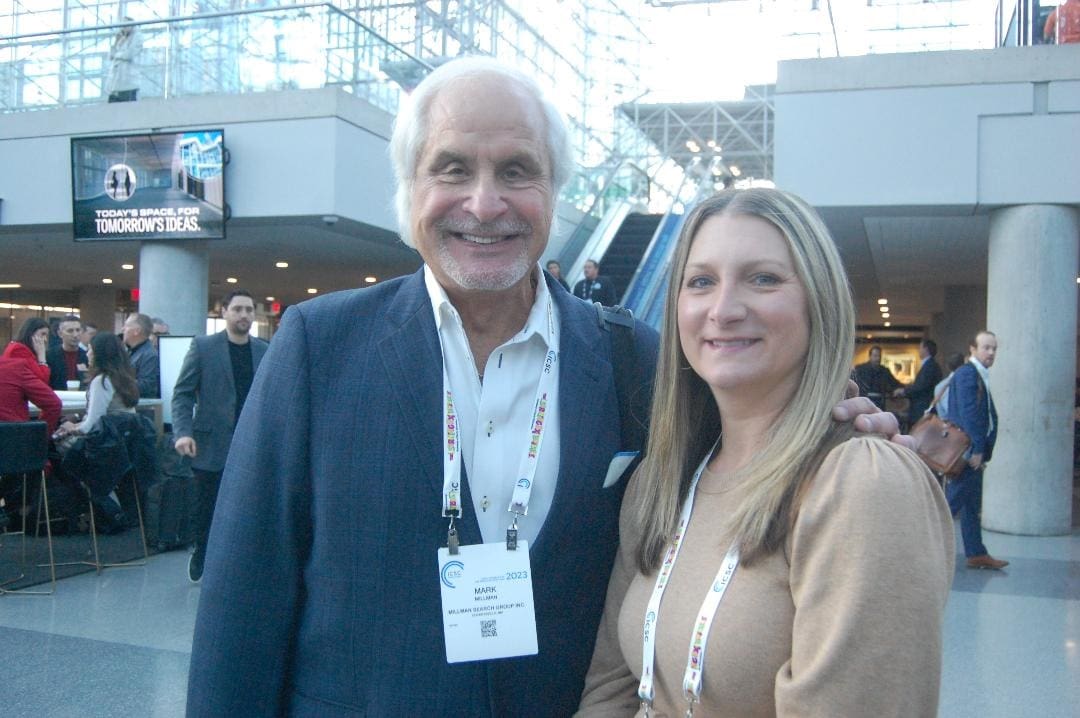
ICSC participants got an early start streaming into the Jacob Javits Convention Center in New York City
The sun-splashed setting within the Jacob Javits Convention Center during the recent ICSC Deal Making event in New York mirrored the common thread repeatedly heard on the showroom floor: optimism. Forward-looking opinions expressed at the event included:
- Retail has taken its hardest punches from a variety of sources but is still thriving;
- Consumers really do prefer shopping at brick-and-mortar locations versus online; and
- The next new concept will immediately take the place of the chain that may have lost its way.
With the national vacancy rate among the lowest ever recorded at just under 5 percent, it seems as If nothing could dampen the unbridled optimism evident among participants at this year’s ICSC show. Even the widely-predicted early 2024 slowdown in consumer spending failed to cause concern.
Return to brick and mortar demonstrates retail’s resiliency
“Retail continues to demonstrate its extreme resiliency and stands the test of time, having overcome the financial crisis, a major pandemic, a rapidly-rising interest rate environment and global situations,” Ross Cooper, President, Chief Investment Officer, Kimco Realty told an ICSC audience at an early-morning seminar. “A big lesson learned in the post-COVID era is that retail remains extremely viable and consumers’ first preference is to visit a brick-and-mortar location. It is up to developers to provide a safe, compelling, and entertaining environment. Those that do will be rewarded by repeat shopping visits from consumers.”
Cooper added that retailers have extra incentive to drive consumers to their brick-and-mortar stores, and that some are placing less emphasis on driving sales through online shopping. “Think about all the steps needed to ship products and then deal with returns and processing,” Cooper said. “It’s just not that profitable to rely so heavily on ecommerce transactions.”
Whitney Livingston, President, Centennial Real Estate, explained that his company is making a concerted effort to redevelop enclosed malls into open-air and mixed-use formats, with multifamily units a significant part of the formula. The mission addresses consumers who have become increasingly experience-driven and are looking for excitement that cannot be achieved online. The goal is to create an 18-hour destination and an experiential environment.
“Seventy-five percent of all retail transactions are still completed in stores,” said Barrie Scardina, President of Americas Retail Services, Agency Leasing & Alliances for Cushman & Wakefield.
Companies that succeed with their hiring embrace flexibility
Recruiting and retaining top talent is playing an increasingly important role in the success of developers and retailers. “We have found that, in the labor market, there is no such thing as a one-size-fits-all solution to hiring,” commented Livingston.
“Companies that succeed with filling their open positions embrace flexibility, have structured annual salary reviews, make staff training and development a top priority, and offer great benefits, perks, and bonuses,” said Chloe Rosenthal, Vice President, Millman Search Group. “We are living through a time right now where employers are being pushed to offer higher salaries and better benefits to attract the best talent. Hopefully we can ride out this wave and get back to business.”

Mark Millman and Chloe Rosenthal, Millman Search Group
The importance of the landlord-tenant relationship
Centennial’s Livingston stressed the importance for owners and developers to become partners with retailers. “There is considerably less tension between landlords and retailers in the post-pandemic era, with the realization that everyone needs to work together to achieve success,” he said.
Cooper echoes those sentiments. “Due diligence was previously a one-way street in which landlords scrutinized the financial reports and past success of retailers to determine if they were worthy of their centers,” he said. “Now, retailers are taking the same approach and making the same efforts with owners/developers. They want to make certain that the landlord they are signing a lease with has the financial wherewithal and experience to operate its properties over the long-term.”
No shortage of new retail concepts

Activity was robust for the more than 50 retailers exhibiting in two-person kiosks that lined the center of the showroom floor. Categories ran the gamut from restaurants to entertainment to fitness and medical. Spotted among the crowd were Beach Bum Tanning, Crunch Fitness, Grocery Outlet, The Joint Chiropractic, Pickleball Smashit, Pollo Campero, and Sports Clips. A healthy supply of retailers was on display throughout the convention hall, with Jersey Mike’s among the only restaurant chain doling out free sandwiches, which is typically a staple at RECon Las Vegas (thanks for lunch, Jersey Mike’s).
One retailer that stood out was Woof Gang Bakery & Grooming, an Orlando, Florida-based group which operates 250 pet grooming, pet food and pet supplies stores in 20 states, with 20 additional sites under development. The concept turns a routine wash into a luxury spa experience for the pet, and tops it off with a selection of treats, food, toys, and accessories. What more could Fido want? According to a representative at the show, pet ownership soared during the pandemic and this translated into rapid national expansion.
Concepts addressing the health and well-being of humans were also present at ICSC, including SweatHouz, an Atlanta-based outfit that bills itself as an Infrared Sauna and Cold Plunge studio. Operating in 20 states, the concept helps people recover from a strenuous workout or injury by reducing body inflammations. Take your choice of sitting in a sauna that reaches temperatures upwards of 155 degrees, or taking a cold plunge that chills the body with 50-degree technology – or both.
“I never would have predicted demand from infrared sauna and plunge concepts, float spas, eyebrow tweezing boutiques, or pickleball facilities,” noted David Donato, Chief Operating Officer of Baltimore-based Continental Realty Corporation, a nationwide investor in open-air shopping centers. “I have given up guessing what the next hot concept will be – the free market will take care of that. I am just glad to be investing in the most resilient real estate type for such a variety of users.”

Continental Realty Corporation’s Monica Johnson and David Donato
Food and beverage still lead the way
Grocery stores were the shining stars during the pandemic, and though sales volumes have returned to more normal levels in a post-pandemic world, there is no denying that the grocery category remains the most important anchor. “Currently, it would take very special circumstances to get us to consider building a new shopping center without having a grocery store tenant in tow,” said P. David Bramble, Managing Partner, and Co-Founder, MCB Real Estate.
“There will always be restrictions on which tenants can co-exist with grocery stores in a particular center,” stated Doug Munson, Head of Advisory Services, RetailStat. “But now more than ever, grocery stores are paying more attention to which concept is located next to them, and this exercise is becoming more strategic than tactical.”

Ross Cooper, Kimco Realty (center) and Whitney Livingston, Centennial Real Estate (right)
“Retail continues to demonstrate its extreme resiliency and stands the test of time, having overcome the financial crisis, a major pandemic, a rapidly-rising interest rate environment and global situations,” Ross Cooper, President, Chief Investment Officer, Kimco Realty told an ICSC audience at an early-morning seminar. “A big lesson learned in the post-COVID era is that retail remains extremely viable and consumers’ first preference is to visit a brick-and-mortar location. It is up to developers to provide a safe, compelling, and entertaining environment. Those that do will be rewarded by repeat shopping visits from consumers.”
Munson also applauds Wegmans Food Markets for its reduced-format store that recently opened in approximately 85,000 square feet of space in Brooklyn, NY. “Even though it is considerably smaller, Wegmans didn’t lose the amazing consumer experience which the company is predicated on,” he said. “This is a lesson for other retailers to not stick with their original prototype, and instead, to experiment with two or three different sizes that fit particular locations.”
“Our retail industry is still dominated by food users, but this growth segment should continue to underwrite this specialized economy and provide the strength needed to offset the negative factors in the global economy,” added Tom Fidler, Executive Vice President and Principal, MacKenzie Retail. “People still want to go out, eat, be entertained and shop. The emphasis on the convention floor was more centric to that growing demand.”
Storm clouds gathering on the horizon
Can anything stop the optimism train that the retail industry is riding? Well, yes, of course, but good luck trying to find someone expressing negative thoughts at this year’s show.
“It’s been an exciting and up-and-down journey the past few years in the retail sector, and it wasn’t too long ago that there were more store closings than openings,” Cushman & Wakefield’s Scardina said. “Higher interest rates make borrowing more expensive, insurance costs are rising and we are dealing with a difficult labor market. But there is an enduring sense of optimism as we head into the new year and everyone believes the best times are before us.”
Larry Lichtenauer is President and Founder of Lawrence Howard & Associates, a boutique public relations agency specializing in the commercial and retail real estate industries. He reports from ICSC deal- making sessions three times annually. Visit www.lawrencehoward.com





























































